大学英语综合教程第二册第四单元教案Unit 4 The Virtual World
全大学英语综合教程第二册UNIT4
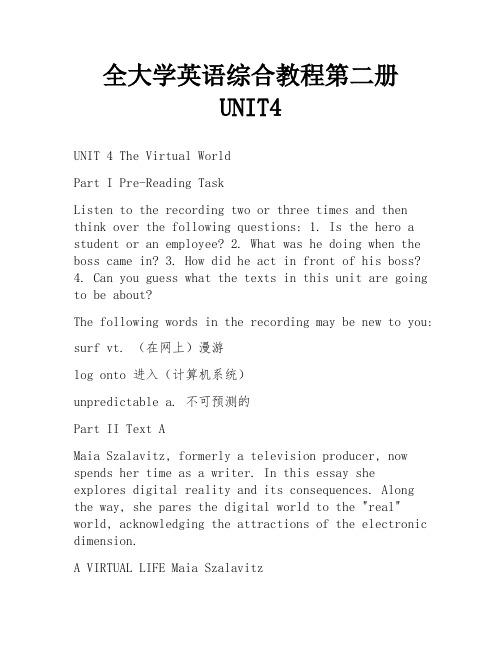
全大学英语综合教程第二册UNIT4UNIT 4 The Virtual WorldPart I Pre-Reading TaskListen to the recording two or three times and then think over the following questions: 1. Is the hero a student or an employee? 2. What was he doing when the boss came in? 3. How did he act in front of his boss?4. Can you guess what the texts in this unit are going to be about?The following words in the recording may be new to you:surf vt. (在网上)漫游log onto 进入(计算机系统)unpredictable a. 不可预测的Part II Text AMaia Szalavitz, formerly a television producer, now spends her time as a writer. In this essay sheexplores digital reality and its consequences. Along the way, she pares the digital world to the "real" world, acknowledging the attractions of the electronic dimension.A VIRTUAL LIFE Maia SzalavitzAfter too long on the Net, even a phone call can be a shock. My boyfriend's Liverpool accent suddenly bees impossible to interpret after his easily understood words on screen; a secretary's clipped tone seems more rejecting than I'd imagined it would be. Time itself bees fluid — hours bee minutes, or seconds stretch into days. Weekends, once a highlight of my week, are now just two ordinary days. For the last three years, since I stopped working as a television producer, I have done much of my work as a telemuter. I submit articles and edit them via email and municate with colleagues on Internet mailing lists. My boyfriend lives in England, so much of our relationship is also puter-assisted. If I desired, I could stay inside for weeks without wanting anything. I can order food, and manage my money, love and work. In fact, at times I have spent as long as three weeks alone at home, going out only to get mail and buy newspapers and groceries.I watched most of the endless snowstorm of'96 on TV. But after a while, life itself begins to feel unreal.I start to feel as though I've bee one with my machines, taking data in, spitting them back out, just another link in the Net. Others on line report the same symptoms. We start to feel an aversion to outside forms of socializing. We have bee the Net critics' worst nightmare. What first seemed like a luxury, crawling from bed to puter, not worrying about hair, and clothes and face, has bee a form of escape, a lack of discipline. And once you start replacing real human contact with cyber-interaction, ing back out of the cave can be quite difficult. I find myself shyer, morecautious, more anxious. Or, conversely, when suddenly confronted with real live humans, I get overexcited, speak too much, interrupt. I constantly worry if I am dressed appropriately, that perhaps I've actually forgotten to put on a skirt and walked outside in the T-shirt and underwear I sleep and live in. At times, I turn on the television and just leave it to talk away in the background, something that I'd never done previously. The voices of the programs are forting, but then I'm jarred by the mercials. I find myself sucked in by soap operas, or needing to keep up with the latest news and the weather. "Dateline," "Frontline," "Nightline," CNN, New York 1, every possible angle of every story over and over and over, even when they are of no possible use to me. Work moves into the background. I decide to check my email. On line, I find myself attacking everyone in sight. I am bad-tempered, and easily angered. I find everyone on my mailing list insensitive, believing that they've forgotten that there are people actually reading their wounding remarks. I don't realize that I'm projecting until after I've been embarrassed by someone who politely points out that I've attacked her for agreeing with me. When I'm in this state, I fight my boyfriend as well, misinterpreting his intentions because of the lack of emotional cues given by our typed dialogue. The fight takes hours, because the system keeps crashing. I say a line, then he does, then crash! And yet we keep on, doggedly. I'd never realized how important daily routine is: dressing for work, sleeping normal hours. I'd never thought Irelied so much on co-workers for pany. I began to understand why long-term unemployment can be so damaging, why life without an externally supporteddaily plan can lead to higher rates of drug abuse, crime, suicide. To restore balance to my life, I force myself back into the real world. I call people,arrange to meet with the few remaining friends who haven't fled New York City. I try to at least get to the gym, so as to set apart the weekend from the rest of my week. I arrange interviews for stories, doctor's appointments — anything to get me out of the houseand connected with others. But sometimes being face to face is too much. I see a friend and her ringing laughter is intolerable — the noise of conversationin the restaurant, unbearable. I make my excuses and flee. I re-enter my apartment and run to the puter as though it were a place of safety. I click on the modem, the once-annoying sound of the connection now as pleasant as my favorite tune. I enter my password. The real world disappears. (820 words)New Words and Expressionsvirtual a. 虚拟的;实质上的accent n. 口音interpret v. 理解;解释;(作)口译clipped a. with a short clear pronunciation 发音快而清脆的tone n. 语气,口气,腔调fluid a. not stable, likely to change 不稳定的,可变的n. 液体stretch v. (cause to) bee longer, wider, etc. without breaking 拉长,伸展telemuter n. one who works from home, municating with the workplace using a puter terminal 远程工submit vt. give (sth.) to sb. so that it may beformally considered 提交,呈递edit vt. revise or correct 编辑email n. 电子邮件 vt. 给…发电子邮件;用电子邮件发municate vi. 通信,交往Internet n. 互联网,因特网relationship n. 关系at times sometimes 有时endless a. having or seeming to have no end 无休止的take in 收进,吸收data n. (datum 的复数形式)数据,资料spit vt. 吐出on line connected to or controlled by a puter (network) 联机地,在线symptom n. 征兆;症状aversion n. a strong feeling of dislike 厌恶,反感socialize vi. mix socially with others 社交,交际critic n. a person who judges or criticizes 评论家;对…持批评态度的人nightmare n. a terrifying dream 噩梦crawl vi. 爬,爬行interaction n. 交往;相互作用cyber-interaction n. 通过网络交往conversely ad. 相反地appropriately ad. 适当地,得体地appropriate a.T-shirt n. T恤衫underwear n. 内衣but then yet at the same time 但另一方面,然而jar v. 使感到不快,刺激(神经等)mercial n. 商业广告 a. 商业的suck v. draw liquid or air into the mouth 吸,吮 suck in 吸引,使卷入;吸收opera n. 歌剧(艺术)soap opera 肥皂剧(以家庭问题为题材的广播或电视连续剧)keep up with learn about or be aware of (the news, etc.); move at the same rate as 及时了解或跟上angle n. a particular way of considering an issue, etc. 角度,立场in sight visible; likely to e soon 可看到的;临近bad-tempered a. having a bad temper 脾气坏的,易怒的insensitive a. not able to feel, unsympathetic toother people's feelings 感觉迟钝的,麻木不仁的sensitive a. 敏感的remark n. 言辞,话语 v. 说,评说project v. imagine that others have (the same feelings, usu. unpleasant ones) as you 以为别人也有(与自己同样的情绪)misinterpret vt. understand wrongly 错误地理解,错误地解释emotional a. 感情上的;动感情的cue n. 提示,暗示doggedly ad. persistently 顽强地,坚持不懈地routine n. 例行事务,日常工作,惯例rely vi. depend confidently, put trust in 依靠,依赖unemployment▲ n. 失业externally ad. 从外面,在外部external a. 外面的,外部的abuse n. wrong or excessive use; cruel treatment 滥用,虐待crime n. (犯)罪suicide n. 自杀restore vt. bring back to a former condition 恢复arrange vt. prepare or plan 安排flee v. run away (from) 逃走;逃离gym n. 体育馆,健身房set apart 使分离,使分开interview n., vt. 接见;面试appointment n. 约会laughter n. 笑,笑声intolerable a. too bad to be endured 不能忍受的,无法容忍的apartment n. 一套公寓房间;公寓click v. (使)发咔哒声;用鼠标点击 n. 咔哒声modem n. 调制解调器annoying a. 讨厌的,恼人的annoy vt. make angry, irritate; bother 使恼怒,使烦恼connection n. 连接tune n. 曲子,曲调password n. 口令,密码Proper NamesMaia Szalavitz 迈亚·塞拉维茨Liverpool 利物浦(英格兰西部港口城市)Dateline 美国National Broadcasting Company (NBC) 的专题新闻报道节目Frontline 美国Public Broadcasting Service (PBS) 的专题新闻报道节目Nightline 美国American Broadcasting Company(ABC)的专题新闻报道节目CNN =Cable News Network (美国)有线新闻电视网Language sense Enhancement1. Read aloud paragraphs 10-13 and learn them by heart.2. Read aloud the following poem:Happily Addicted to the WebDoorbell rings, I'm not listening, From my mouth,drool is glistening, I'm happy — although My parents are not — Happily addicted to the Web.All night long, I sit clicking, Unaware time is ticking, There's heard on my cheek, Same clothes for a week, Happily addicted to the Web.Friends e by; they shake me, Saying, "Yo, man! Don't you know tonight's senior prom?" With a shrug, I replied, "No, man; I just discovered letterman-dot-!"I don't phone, don't send faxes, Don't go out, don't pay taxes, Who cares if someday They drag me away? I'm happily addicted to the Web!3. Re。
新视野大学英语第二版综合教程2课后第四单元答案第二册完整版
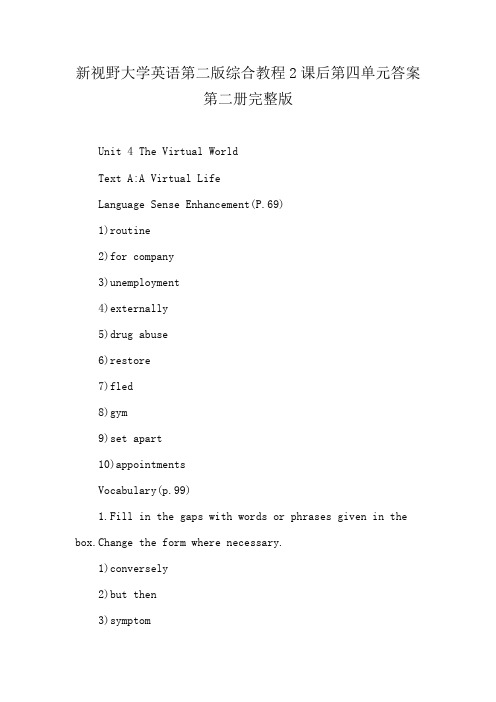
新视野大学英语第二版综合教程2课后第四单元答案第二册完整版Unit 4 The Virtual WorldText A:A Virtual LifeLanguage Sense Enhancement(P.69)1)routine2)for company3)unemployment4)externally5)drug abuse6)restore7)fled8)gym9)set apart10)appointmentsVocabulary(p.99)1.Fill in the gaps with words or phrases given in the box.Change the form where necessary.1)conversely2)but then3)symptom4)spitting5)abusing6)tone7)took…in8)editing9)have arranged10)in sight11)stretched12)data2.Rewrite each sentence with the word or phrase in brackets,keeping the same meaning.The first part has been written for you.1)smoking cigarettes jars on me2)find themselves getting sucked in3)has arranged for a technician from the computer store to check and repair it4)fled their country to avoid military service/fled to other countries to avoid military service5)restore people’s confidence in itplete the sentences,using the words and phrases in brackets.Make additions or changes where necessary.1)the virtual,on line,via2)nightmare,routine,any appointment,arrange for3)cue,remarks,his tuneII.Collocation(p.101)1.We came here all the way on foot.2.Private cars are not allowed on campus.3.They are on vacation in Florida.4.Mary has been talking to her friend on the phone for an hour.5.Don’t worry,Lucy is always on time.6.Industrial demand on fuel is on the rise.age(p.102)1.hard2.difficult3.impossible4.tough5.hard6.easyComprehensive Exercises(p.102)I.Cloze(p.102)1.Text-related(It is done in class)2.Theme-related(1)companion(2)deliver(3)access(4)enables(5)customers(6)delights(7)provides(8)small(9)remote(10)informationII.Translation(p.103)1.Translate the sentences into English,using the words or phrases in brackets.1)Research shows that laughter can bring a lot of health benefits.2)A slow Internet connection speed is really annoying.3)As the law stands,helping someone commit suicide is a crime.4)In her report,Mary tries to interpret the data from a completely different angle.5)Sue is a girl of great talent.Her amazing memory sets her apart from her classmates.2.Translate the passage into English,using the words andphrases given.(p.104)Perhaps you envy me for being able to work from home on the computer.I agree that the Internet has made my job a lot easier.I can write,submit and edit articles via email,chat with my colleagues on line and discuss work with my boss.With a click of the mouse,I can get all the data I need and keep up with the latest news.But then,communicating through the Net can be frustrating at times.The system may crash.Worse still,without the emotional cues of face-to-face communication,the typed words sometimes seem difficult to interpret.。
unit4-全新版大学英语(第二版)综合教程2电子教案
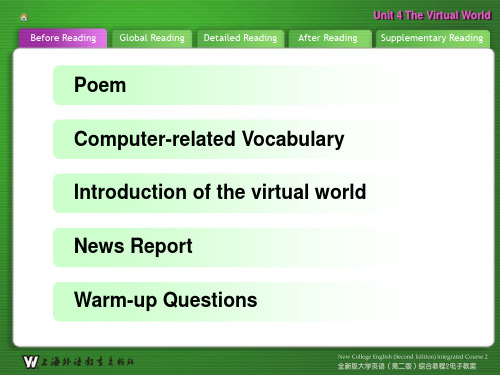
Unit 4 The Virtual World Unit 4 The Virtual World
Before Reading Global Reading Detailed Reading After Reading Supplementary Reading
Some virtual colleges are: APCO Virtual College, Virtual College of Elizabeth City State University
Introduction of the Virtual World Some Famous Websites
Detailed Reading
SOHO — Small-Office/Home-Office
Virtual College
Unit 4 The Virtual World Unit 4 The Virtual World
Detailed Reading
Unit 4 The Virtual World Unit 4 The Virtual World
Before Reading Global Reading Detailed Reading After Reading Supplementary Reading
Detailed Reading
Detailed Reading
1. What was the hero doing when his boss came in?
Surfing the Internet. 2. How did he act in front of his boss? He pretended to be surprised at the computer which had crashed “unexpectedly”. 3. What would you do if you were in such a situation? Open ended.
全新版大学英语综合教程第二册教案Unit4
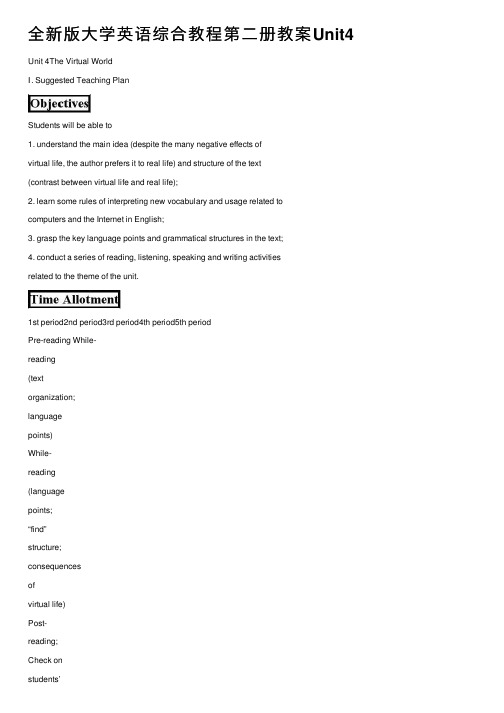
全新版⼤学英语综合教程第⼆册教案Unit4 Unit 4The Virtual WorldⅠ. Suggested Teaching PlanStudents will be able to1. understand the main idea (despite the many negative effects ofvirtual life, the author prefers it to real life) and structure of the text(contrast between virtual life and real life);2. learn some rules of interpreting new vocabulary and usage related tocomputers and the Internet in English;3. grasp the key language points and grammatical structures in the text;4. conduct a series of reading, listening, speaking and writing activitiesrelated to the theme of the unit.1st period2nd period3rd period4th period5th periodPre-reading While-reading(textorganization;languagepoints)While-reading(languagepoints;“find”structure;consequencesofvirtual life)Post-reading;Check onstudents’homereading(Text B)Theme-RelatedLanguageLearn-ing Tasks1. T asks Ss the following questions on the poem Surfing the Internet:(5minutes)* What was the hero doing when his boss came in? (surfing the Internet) * How did he act in front of his boss? (He pretended to be surprised at the computer which had crashed “unexpectedly”.)2. Ss look at the theme of this unit (The Virtual World) and the title of TextA (A Virtual Life), then try to: (10 minutes)* find antonyms of “virtual world” and “virtual life”; (real world, real life) * suggest synonyms for “virtual world”; (cyberspace, cyberia, etherworld, virtual reality, Internet world, net world, etc.)* say what people can do on the Internet, (communicating with people, shopping, reading, entertainment, education, working, hacking, publishing, etc.)3. Imaginative writing(28 minutes)1) T dictates to Ss the following paragraph:For the past two weeks, other participants of the Net Survival Contest (⽹络⽣存竞赛)and I have been shut up in bare hotel rooms.Our only link to the real world has been a computer that is hooked up to the Internet (联⽹电脑). We have relied on it, not only for food, bed sheets and other daily necessities, but also to set up an e-business (电⼦商务)of our own.2) Now Ss will complete the next paragraph beginning with: “Now it istime for me to walk out into the light of day again...” They willgive their imagination full play. They will write no more than 100words.3) Ss form groups of four to five, and read aloud to each other theirown writings.4) T asks some groups to recommend the best piece in their group tothe class.4. T may lead in to Text A by saying: Some of us like to live a life in contact with real things and real people, but others favora virtual existence. Which life is better? I’m sure you have different opinions. Now let’s read Text A to find out what Maia Szalavitz has to say about these two life styles. (2 minutes)1. Text organization (15 minutes)1) T draws Ss’ attention to Text Organization Exercise 1, and lets themread its instructions as well as what has already been done for them in this exercise.2) Ss try to complete the exercise by simply reading the first sentence ofeach paragraph in Text A.1) Ss compare answers with each other; if necessary, T may help.2. T explains the key language points and gives Ss practice (see LanguageStudy). (45 minutes)3. T guides Ss through Structure Exercise 2. (10 minutes)2. Ss re-read Paras 4-10, work in pairs to find out consequences of “my”virtual life. Can they use the “find oneself + adj./ past participle/present participle” structure when summing up the conse-quences? (10 minutes)3. Some pairs report to the class their findings, using the “find” structure.(5 minutes)1. Computer-related vocabulary items (20 minutes)1) Ss scan Text A to find out vocabulary items related to computer andthe Internet. (They are: virtual life, the net, telecommuter, email,Internet mailing lists, computer-assisted, data, link, cyber-interaction, on line, system crash, click on the modem, connection,password)2) T tells Ss that new terms related to computer and the Internet areconstantly added to the English vocabulary, so much so that many ofthem are not included in any English dictionary. However, if weapply certain rules, their meanings are easy to deduce.3) T gives Ss more examples of computer-related vocabulary items (seeText Analysis).2. T guides Ss through some after-text exercises. (25 minutes)3. T checks on Ss’ home reading (Text B). (3 minutes)4. Ss do Part IV: Theme-Related Language Learning Tasks. (1 period)5. T asks Ss to prepare the next unit: (2 minutes)1) do the pre-reading task;2) preview Text A.Ⅱ.Text AnalysisThe most dynamic combining forms/prefixes for new computer-and-Internet-related vocabulary in English are cyber-, virtual, Net- (net-), Web-(web-), and E- (e-).New English vocabulary items derived from them usually appear in the following forms:1. combining forms/prefixes + noun: this is the most common type, e.g.virtual life (虚拟⽣活), virtual world (虚拟世界), virtualcommunity(虚拟社区), virtual office (虚拟办公室), virtual pet (虚拟宠物),virtual reality (虚拟现实),cyber-interaction (⽹络互动),cyberculture(⽹络⽂化),cybernut (⽹⾍), cyberpet(电⼦宠物),cyberspace (⽹络空间), netwriter(发送电⼦邮件的⼈),nethead (⽹⾍), Webmaster (⽹站维护者), Web page (⽹页), website (⽹站),WebTV (⽹络电视机), E-book (电⼦书籍), E-shopper (⽹上购物者), e-card (电⼦贺卡), e(-)mail (电⼦邮件), e-journal (电⼦杂志),e-business (电⼦商务), e-cash (电⼦货币), e-commerce (电⼦商务). 2. combining forms/prefixes + verb: e.g. cybersurf (⽹络漫游), netsurf (⽹络漫游), websurf (⽹络漫游),email (发送电⼦邮件)3. words like cyber, net, etc. + suffix: e.g. cyberian (cyber + ian, ⽹络⽤户), cyberphobia (cyber + phobia, 电脑恐惧症), cybernaut (cyber +naut ⽹络⽤户), netter (net + er ⽹民), Webify (web + fy 使万维⽹化), cyberize (cyber + ize, 使联⽹).4. clipped word: cyberdoc (cyber + doctor, ⽹络医⽣), Netcast (Net +broadcast,⽹络播放), Netiquette (Net + etiquette, ⽹规), Netizen (Net+ citizen, ⽹民,), Netpreneur (Net + entrepreneur, ⽹络企业家),Webcam (Web + camera, ⽹络摄像机), Webcasting (Web + broadcasting,⽹络播放), Webliography (Web + bibliogrpahy, ⽹络书⽬), Webnomics (Web + economics, ⽹络经济), Webzine (Web +magazine, ⽹络杂志), e-tailing (electronic + retailing,电⼦零售), e-zine (electronic + magazine,电⼦杂志)Ⅲ. Cultural Notes1. the Internet: an international computer network for the exchange of information. It was originally used mainly in the academic and military worlds but has since become available to the large and increasing number of people with personal computers. Other services, e.g. the World Wide Web, are available through it.The Internet is changing our lives and a parallel universe is rapidly emerging online. Today there’s scarcely an aspect of our life that isn’t being upended by the torrent of information available on the hundreds of millions of sites crowding the Internet, not to mention its ability to keep us in constant touch with each other via electronic mail. The Internet is saving companies billions of dollars in producing goods and serving the needs of their customers. Nothing like it has been seen since the beginning of the Industrial Revolution, when power-driven machines began producing more in a day than men could turn out in nearly a year. The Internet and e-commerce are viewed as a global megatrend along the lines of the printing press, the telephone, the computer and the electricity.You would be hard pressed to name something that isn’t available on the Internet. Consider: books, health care, movie tickets, baby clothes, stocks, real estate, toys and airline tickets. American kids today are so computer savvy that it virtually ensures the United States will remain the unchallenged leader in cyberspace for the foreseeable future. Most kids use computers to play games and have email chats with friends.What’s clear is that, whether we like it or not, the Internet is an ever-growing part of our lives and there is no turning back. 2. NBC (the National Broadcasting Company): the first of the originalthree US national broadcasting companies. It was established in 1926by Radio Corporation of America as two groups of radio stations. Thefirst NBC television channel opened in 1940. The company is nowowned by General Electric. Its main offices are at Rockefeller Centerin New York.3. PBS (the Public Broadcasting Service): (in the US) a televisionsystem that broadcasts programs to an association of local stationswhich use no television advertisements and do not make a profit. Itwas established by the Public Broadcasting Act and is supported bymoney from the US Government, large companies and the public.PBS is known for the high quality of its programs.4. ABC (the American Broadcasting Company): one of the original threemajor television networks in America. It began in 1943 as the BlueNetwork of six radio stations. ABC is now owned by the Walt DisneyCompany .Ⅳ. Language Study1. virtual: 1) created and existing only in a computerExamples: I can visit a virtual store and put what I want in my basket atthe click of a mouse button.Some people spend too much time escaping from reality intothe virtual world conjured up on their computer screens.2) being or acting as what is described, but not accepted as such inname or officiallyExamples: Our deputy manager is the virtual head of the business.Now that the talks have broken down, war in the region looks like a virtual certainty.2. interpret: 1) understand (sth. said, ordered, or done)Examples: They are worried that the students might interpret the new regulation as a restriction of their rights. She interprets the dream as an unconscious desire to be young again.2) give or provide the meaning of,explainExamples: How do you interpret his refusal tosee us?This dream can be interpreted in several different ways.3) translate what is said in one language into anotherExamples: I am terribly sorry, but I don’t understand a word. Could you interpret for me?No one in the tour group spoke Spanish so we had to ask the guide to interpret.3. tone: a particular quality or intonation of the voiceExamples: From the tone of her voice I could tell she was very angry.Suddenly he laughed again, but this time with a cold, sharptone.4. stretch: (cause to) become longer, wider, etc. without breakingExamples: My working day stretches from seven in the morning toeight at night.The child stretched the rubber band to its full extent.5. submit: give (sth.) to sb. so that it may be formally considered (followed by to)Examples: You should submit your reports to the committee.I am going to submit an application for that job in Microsoft.Peter submitted his plans for the new town square to the local government.6. edit: revise or correctExamples: Jack is busy editing Shakespeare’s plays for use in schools.John didn’t finish editing the annual report until the end of lastmonth.7. email: electronic mailExamples: Young people like to keep in touch with their friends via email.I received an email from my studentyesterday.vt. send an email toExamples: I will email you the instant I get thenews.She’ll email me a question before she calls so I can think it overin advance.8. communicate: contact sb. in any way, esp. by speaking to them, writing to them or calling them (followed by with) Examples: Some young people depend heavily on email to communicate with each other.They have been divorced for years and never communicated with each other.9. the Internet: the worldwide network of computer links which allows computer users to connect with computers all over the world, and which carries electronic mailExamples: Whether we like it or not, the Internet is an ever-growing partof our lives.You can take online courses and earn your degree via theInternet whenever and wherever you want to.It’s believed the Internet was born in 1969 when twocomputers at the University of California, Los Angeles wereconnected by a 15 foot cable.10. relationship: state of being connectedExamples: What is the relationship between language and thought?The scientist had a good working relationship with his Americancolleagues.11. at times: sometimesExamples: She has been away from her home for about a year. At times she wishes she had never left. He went on listening to her, at times impatient and at times fascinated.12. take in: absorb (sth.) into the body by breathingor swallowingExamples: The earth takes in heat and light fromthe sun.Fish take in oxygen through their gills.13. data: information, usu. in the form of facts or statistics thatyou can analyzeExamples: This data is stored on the network and can beaccessed by anybody.The data is still being analyzed, so I can’t tell you the results.14. spit: send (liquid, food, etc.) out from the mouth (used in the pattern: spitsth. (out) (at/on/onto sbJsth.))Examples: The baby spat its food out on the table.He took one sip of the wine and spat it out.15. on line: connected to or controlled by a computer(network)Examples: Our system is on line to the maincomputer.The largest online institution is the University of Phoenix, withsome 1000 students today and hopes of reaching 200,000 studentsin 10 years.16. symptom: 1) sign of the existence of sth. badExamples: High interest rates are a symptom of a weak economy.They regard the increase in crime as a symptom of a more generaldecline in moral standards.2) change in the body that indicates an illnessExamples: A cold, fever and headache are the usualsymptoms of flu.If the symptoms persist, it is important to go to your doctor.17. nightmare: a terrifying dreamExamples: Tom didn’t eat fish because it gives him nightmares.Watching horror films gives menightmares.I had a nightmare about falling off theskyscraper.18. conversely: in a way that is opposite to sth.Examples: $1 will buy 100 yen worth of Japanese goods. Conversely, 100 yen will buy $1 worth of American goods. You can add the fluid to the powder or, conversely, the powder to the fluid.19. but then: yet at the same timeExamples: The failure of China’s soccer team looks inevitable. But then, anything can happen in football.Mary performed better than the others in the final exam; but then,she spent much longer on it than they did.20. jar: have a harsh or an unpleasant effect (used in the pattern: jarsth., jar on sbJsth.)Examples: You shouldn’t have too many colors in a small space as the effect can jar.The loud bang jarred my nerves.Her squeaky voice jarred on me.21. suck in: (usu. passive) involve (sb.) in an activity, an argument, etc., usu.against their will (used in the pattern: suck sb. in/into sth.; suck in)Examples: I don’t want to get sucked into the debate about school reform.Some teenagers don’t want to get involved with gangs, but theyfind themselves getting sucked in.22. keep up with: learn about or be aware of (thenews, etc.)Examples: Carrie likes to keep up with the latestfashions.He didn’t bother to keep up with the news. His only concern wasto study.23. Work moves into the background: Work becomes secondary to me.24. in sight: 1) visibleExamples: It was early in the morning and there wasn’t anyone in sight oncampus.As the train pulled into the station my parents standing on theplatform were soon in sight.2) likely to come soonExamples: Two months passed, and victory was not yetin sight.The end of the economic nightmare is still nowhere in sight.A solution to the problem of environmental pollution now seemsin sight.25. remark: thing said or written as a commentExamples: The principal of the school made some remarks about educational reform at the meeting. Mr. Smith approached us and made a couple of remarks aboutthe weather.His rude remark about my book jarred on me.26. emotional: 1) of the emotionsExamples: She is grateful to him for his emotional support while she wasin trouble.It’s quite difficult to handle emotional problems.2) having emotions that are easily excitedExamples: Marie got very emotional when we parted, andstarted to cry.It’s said that the Italians are more emotional than we are.27. cue: anything that serves as a signal about what to do or say (followedby to / for)Examples: When he started to talk about the finances, that was our cue toget up quietly and leave.When I nod my head, that’s your cue to giveflowers to him.Mr. Clinton’s excitement was the cue for acampaign.28.1 say a line: I type a line on the screen.29. routine: a fixed and regular way of doing things (oftenadjectival)Examples: The job is really just a dull series of fairly routine tasks. I don’t think you’ll take it.He established a new routine after retirement.30. rely on/upon: depend confidently on, put trust inExamples: Nowadays we rely increasingly on computers to control theflow of traffic.Some children relied heavily on the advice of theirparents.31.abuse: wrong or bad use or treatment of sth./sb.Examples: The World Health Organization (WHO) has published a report on drug abuse and addiction.The policemen are making an investigationof child abuse.32. restore: bring back to a former condition (used in the pattern: restoresth.; restore sb. to sth.)Examples: Law and order will be quickly restored after the incident.Winning three games restored their confidence.Doing sports every day restored the old man to good health.The deposed king was restored to power.33. arrange: prepare or plan (used in the pattern: arrange sth.; arrange todo sth.; arrange for sb./ sth. to do sth.)Examples: Her marriage was arranged by her parents.Let’s arrange to have a dinner together some time before wegraduate.I have arranged for a taxi to pick us up at 8:00 a.m.I could arrange for you to come along with us if you like.34. flee: run away (from) (used in the pattern: flee from/to; fleesomeplace)Examples: The customers fled from the bank when the alarmsounded.During the war, thousands upon thousands of Afghans fled the country.Up to five million political refugees have fled to other countries.35. interview: 1) a meeting at which a journalist asks sb. questions inorder to find out their newsExamples: In an exclusive interview with our reporter, the film star revealed some of his personal affairs.Radio interviews are generally more relaxed than television ones.2) a formal meeting at which sb. applying for a job is askedquestions, as a way of judging how suitable they are Examples: I have been asked to go for an interview for a project I applied for at Harvard University.She has had a couple of job interviews, but nooffers.v.Examples: As a journalist, he interviewed manygovernment officials.After the press conference, the journalist interviewed the UN Secretary General about the Israeli-Palestinian conflict.I will be interviewed next week for the Chief Executive’s job.36. appointment: an arrangement to meet or visit sb. at a particular time (followed by with)Examples: You can’t see the president of the university unless you make an appointment.I’ve made an appointment to see my tutor tomorrow.37. click: press or release a mouse button rapidly, as to select an icon (followed by on)Example: When shopping online, you just click the mouse and order what you want to buy.38. tune: a series of musical notes that is pleasant andeasy to rememberExamples: She whistled a happy tune all the wayhome.He was humming a merry tune while cooking.。
全新版大学英语 第二册 Unit4 B2U4
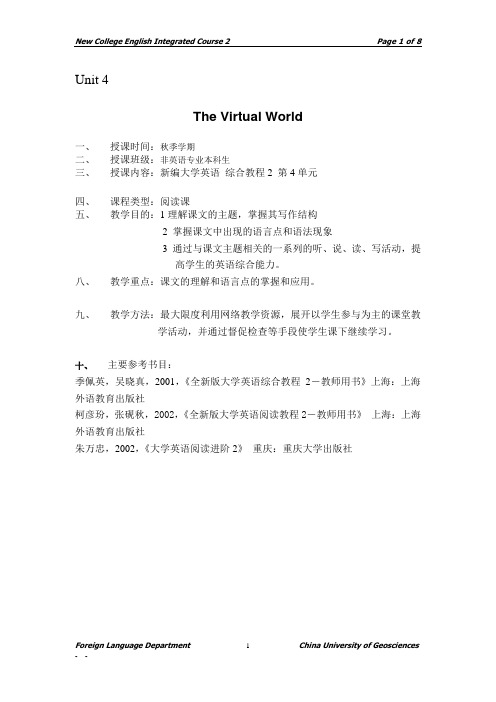
Unit 4The Virtual World一、授课时间:秋季学期二、授课班级:非英语专业本科生三、授课内容:新编大学英语综合教程2 第4单元四、课程类型:阅读课五、教学目的:1理解课文的主题,掌握其写作结构2 掌握课文中出现的语言点和语法现象3 通过与课文主题相关的一系列的听、说、读、写活动,提高学生的英语综合能力。
八、教学重点:课文的理解和语言点的掌握和应用。
九、教学方法:最大限度利用网络教学资源,展开以学生参与为主的课堂教学活动,并通过督促检查等手段使学生课下继续学习。
十、主要参考书目:季佩英,吴晓真,2001,《全新版大学英语综合教程2-教师用书》上海:上海外语教育出版社柯彦玢,张砚秋,2002,《全新版大学英语阅读教程2-教师用书》上海:上海外语教育出版社朱万忠,2002,《大学英语阅读进阶2》重庆:重庆大学出版社Unit 4 The Virtual WorldObjectives:1) Understand the main idea and structure of the text.2) Learn some rules of interpreting new vocabulary and usage related to computers and the Internet in English.3) Grasp the key language points and grammatical structures in the text.4) Conduct a series of reading, speaking and writing activities related to the theme of the unit. Time Allocation and Course Arrangement:Pre-reading Tasks: (50 minutes)1. Warming-up exercise: Deliver handout about the introduction of Internet and ask concerned questions for Ss to discuss first and then answer them. (15’)2. Do the pre-reading task on pp.100. (10’)3. Listen to the recording twice and then discuss the following questions with your partner. (15’)1) Is the hero a student or an employee?2) What was he doing when the boss came in?3) How did he act in front of his boss?4. Ask Ss to find antonyms of “virtual world” and “virtual life” in the text. (10’)While-reading Tasks: (40 minutes)1. Ss are asked to skim the text and then do the Text Organization Exercise on page 107. (15’)2. Detail ed Reading: Ss discuss the following questions and report to the class (30’)1) Question for Paragraph 1What does the author feel after too long on the Net?2) Questions for Paragraph 2-3What did the author do three years ago and what is she doing now?How does the author manage her daily life?3) Questions for Paragraph 4-10What are the symptoms shared by people who live a virtual life?How does the author behave when she is suddenly confronted with real live humans?How does the author behave on line? Why?4) Questions for Paragraph 11-12What does the author do in order to return to the real world?Does she feel happy doing so?5) Question for paragraph 13When dissatisfied with the real world, what does the author do?Homework:1. Deliver handouts about language points and ask Ss to review them after class.2. Finish exercises of unit 1.3. Finish reading Text B.4. Ss prepare for follow-up discussion: The pros and cons of InternetAfter-reading Tasks: (90 minutes)1. Group discussion on the pros and cons of Internet. (30’)2. The presentation of each group. (20’)3. Check on Ss’ homework. (20’)4. Test of Unit 3. (10’)II. Language Study1. virtual: 1) created and existing only in a computerExamples: I can visit a virtual store and put what I want in my basket at the click of a mouse button.Some people spend too much time escaping from reality into the virtual worldconjured up on their computer screens.2) being or acting as what is described, but not accepted as such in name or officially Examples: Our deputy manager is the virtual head of the business.Now that the talks have broken down, war in the region looks like a virtual certainty.2. interpret: 1) understand (sth. said, ordered, or done)Examples: They are worried that the students might interpret the new regulation as a restriction of their rights.She interprets the dream as an unconscious desire to be young again.2) give or provide the meaning of, explainExamples: How do you interpret his refusal to see us?This dream can be interpreted in several different ways.3) translate what is said in one language into anotherExamples: I am terribly sorry, but I don't understand a word. Could you interpret for me?No one in the tour group spoke Spanish so we had to ask the guide to interpret.3. tone: a particular quality or intonation of the voiceExamples: From the tone of her voice I could tell she was very angry.Suddenly he laughed again, but this time with a cold, sharp tone.4. stretch: (cause to) become longer, wider, etc. without breakingExamples: My working day stretches from seven in the morning to eight at night.The child stretched the rubber band to its full extent.5. submit: give (sth.) to sb. so that it may be formally considered (followed by to)Examples: You should submit your reports to the committee.I am going to submit an application for that job in Microsoft.Peter submitted his plans for the new town square to the local government.6. edit: revise or correctExamples: Jack is busy editing Shakespeare's plays for use in schools.John didn't finish editing the annual report until the end of last month.7. email: electronic mailExamples: Young people like to keep in touch with their friends via email.I received an email from my student yesterday.vt. send an email toExamples: I will email you the instant I get the news.She'll email me a question before she calls so I can think it over in advance.8. communicate: contact sb. in any way, esp. by speaking to them, writing to them or callingthem (followed by with)Examples: Some young people depend heavily on email to communicate with each other.They have been divorced for years and never communicated with each other.9. the Internet: the worldwide network of computer links which allows computer users to connectwith computers all over the world, and which carries electronic mail Examples: Whether we like it or not, the Internet is an ever-growing part of our lives.You can take online courses and earn your degree via the Internet whenever andwherever you want to.It's believed the Internet was born in 1969 when two computers at the Universityof California, Los Angles were connected by a 15 foot cable.10. relationship: state of being connectedExamples: What is the relationship between language and thought?The scientist had a good working relationship with his American colleagues. 11. at times: sometimesExamples: She has been away from her home for about a year. At times she wishes she hadnever left.He went on listening to her, at times impatient and at times fascinated.12. take in: absorb (sth.) into the body by breathing or swallowingExamples: The earth takes in heat and light from the sun.Fish take in oxygen through their gills.13. data: information, usu. in the form of facts or statistics that you can analyzeExamples: This data is stored on the network and can be accessed by anybody.The data is still being analyzed, so I can't tell you the results.14. spit: send (liquid, food, etc.) out from the mouth (used in the pattern: spit sth. (out) (at/on/ontosb./sth.))Examples: The baby spat its food out on the table.He took one sip of the wine and spat it out.15. on line: connected to or controlled by a computer (network)Examples: Our system is on line to the main computer.The largest online institution is the University of Phoenix, with some 1000 studentstoday and hopes of reaching 200,000 students in 10 years.16. symptom: 1) sign of the existence of sth. badExamples: High interest rates are a symptom of a weak economy.They regard the increase in crime as a symptom of a more general decline in moralstandards.2) change in the body that indicates an illnessExamples: A cold, fever and headache are the usual symptoms of flu.If the symptoms persist, it is important to go to your doctor.17. nightmare: a terrifying dreamExamples: Tom didn't eat fish because it gives him nightmares.Watching horror films gives me nightmares.I had a nightmare about falling off the skyscraper.18. conversely: in a way that is opposite to sth.Examples: $1 will buy 100 yen worth of Japanese goods. Conversely, 100 yen will buy $1 worth of American goods.You can add the fluid to the powder or, conversely, the powder to the fluid.19. but then: yet at the same timeExamples: The failure of China's soccer team looks inevitable. But then, anything can happen in football.Mary performed better than the others in the final exam; but then, she spent muchlonger on it than they did.20. jar: have a harsh or an unpleasant effect (used in the pattern: jar sth., jar on sb./sth.)Examples: You shouldn't have too many colors in a small space as the effect can jar.The loud bang jarred my nerves.Her squeaky voice jarred on me.21. suck in: (usu. passive) involve (sb.) in an activity, an argument, etc., usu. against their will(used in the pattern: suck sb. in/into sth.; suck in )Examples: I don't want to get sucked into the debate about school reform.Some teenagers don't want to get involved with gangs, but they find themselvesgetting sucked in.22. keep up with: learn about or be aware of (the news, etc.)Examples: Carrie likes to keep up with the latest fashions.He didn't bother to keep up with the news. His only concern was to study.23. Work moves into the background: Work becomes secondary to me.24. in sight: 1)visibleExamples: It was early in the morning and there wasn't anyone in sight on campus.As the train pulled into the station my parents standing on the platform were soonin sight.2) likely to come soonExamples: Two months passed, and victory was not yet in sight. ,The end of the economic nightmare is still nowhere in sight.A solution to the problem of environmental pollution now seems in sight.25. remark: thing said or written as a commentExamples: The principal of the school made some remarks about educational reform at the meeting.Mr. Smith approached us and made a couple of remarks about the weather.His rude remark about my book jarred on me.26. emotional: 1) of the emotionsExamples: She is grateful to him for his emotional support while she was in trouble.It's quite difficult to handle emotional problems.2) having emotions that are easily excitedExamples: Marie got very emotional when we parted, and started to cry.It's said that the Italians are more emotional than we are.27. cue: anything that serves as a signal about what to do or say (followed by to/for)Examples: When he started to talk about the finances, that was our cue to get up quietly and leave.When I nod my head, that's your cue to give flowers to him.Mr. Clinton's excitement was the cue for a campaign.28. I say a line: I type a line on the screen.29. routine: a fixed and regular way of doing things (often adjectival)Examples: The job is really just a dull series of fairly routine tasks. I don't think you'll take it.He established a new routine after retirement.30. rely on/upon: depend confidently on, put trust inExamples: Nowadays we rely increasingly on computers to control the flow of traffic.Some children relied heavily on the advice of their parents.31. abuse: wrong or bad use or treatment of sth./sb.Examples: The World Health Organization (WHO) has published a report on drug abuse and addiction.The policemen are making an investigation of child abuse.32. restore: bring back to a former condition (used in the pattern: restore sth.; restore sb. to sth.)Examples: Law and order will be quickly restored after the incident.Winning three games restored their confidence.Doing sports every day restored the old man to good health.The deposed king was restored to power.33. arrange: prepare or plan (used in the pattern: arrange sth.; arrange to do sth.; arrange for sb./sth. to do sth.)Example: Her marriage was arranged by her parents.Let% arrange to have a dinner together some time before we graduate.I have arranged for a taxi to pick us up at 8:00 a.m.I could arrange for you to come along with us if you like.34. flee: run away (from) (used in the pattern: flee from/to; flee someplace)Examples: The customers fled from the bank when the alarm sounded.During the war, thousands upon thousands of Afghans fled the country.Up to five million political refugees have fled to other countries.35. interview: 1) a meeting at which a journalist asks sb. questions in order to find out their newsExamples: In an exclusive interview with our reporter, the film star revealed some of his personal affairs.Radio interviews are generally more relaxed than television ones.2) a formal meeting at which sb. applying for a job is asked questions, as a way ofjudging how suitable they areExamples: I have been asked to go for an interview for a project I applied for at Harvard University.She has had a couple of job interviews, but no offers.v.Examples: As a journalist, he interviewed many government officials.After the press conference, the journalist interviewed the UN Secretary Generalabout the Israeli-Palestinian conflict.I will be interviewed next week for the Chief Executive's job.36. appointment: an arrangement to meet or visit sb. at a particular time (followed by with)Examples: You can't see the president of the university unless you make an appointment.I've made an appointment to see my tutor tomorrow.37. click: press or release a mouse button rapidly, as to select an icon (followed by on)Example: When shopping online, you just click the mouse and order what you want to buy.38. tune: a series of musical notes that is pleasant and easy to rememberExamples: She whistled a happy tune all the way home.He was humming a merry tune while cooking.. Homework:1.Recite the words and phrases of this unit.2.Finish doing the exercises.3.Preview Unit 5。
全新版大学英语综合教程2unit4教案
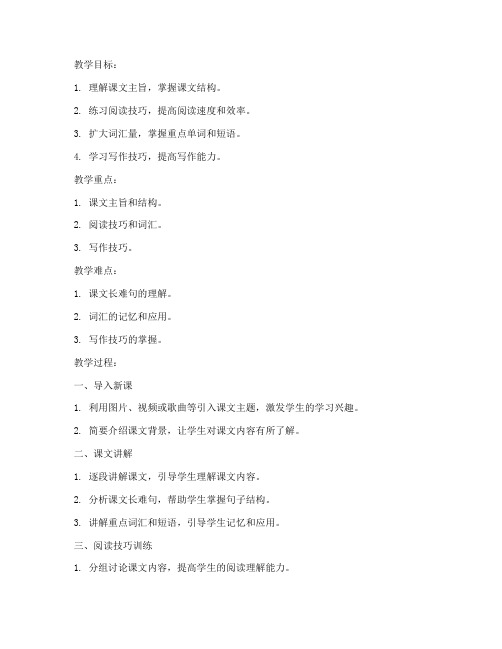
教学目标:1. 理解课文主旨,掌握课文结构。
2. 练习阅读技巧,提高阅读速度和效率。
3. 扩大词汇量,掌握重点单词和短语。
4. 学习写作技巧,提高写作能力。
教学重点:1. 课文主旨和结构。
2. 阅读技巧和词汇。
3. 写作技巧。
教学难点:1. 课文长难句的理解。
2. 词汇的记忆和应用。
3. 写作技巧的掌握。
教学过程:一、导入新课1. 利用图片、视频或歌曲等引入课文主题,激发学生的学习兴趣。
2. 简要介绍课文背景,让学生对课文内容有所了解。
二、课文讲解1. 逐段讲解课文,引导学生理解课文内容。
2. 分析课文长难句,帮助学生掌握句子结构。
3. 讲解重点词汇和短语,引导学生记忆和应用。
三、阅读技巧训练1. 分组讨论课文内容,提高学生的阅读理解能力。
2. 进行阅读速度和效率的训练,如快速阅读、略读、扫读等。
四、词汇学习1. 列出课文中的重点单词和短语,引导学生记忆。
2. 设计词汇练习,如填空、翻译、选择题等,巩固所学词汇。
五、写作技巧讲解1. 分析课文中的写作技巧,如句式、段落结构等。
2. 讲解写作技巧,如如何开头、如何过渡、如何结尾等。
六、写作练习1. 学生根据所学写作技巧,进行写作练习。
2. 教师批改作文,指出学生存在的问题,并进行讲解。
七、课堂小结1. 总结本节课所学内容,强调重点和难点。
2. 布置课后作业,如复习课文、完成写作练习等。
教学评价:1. 课堂表现:观察学生在课堂上的参与度、积极性等。
2. 课后作业:检查学生完成作业的情况,了解学生对课文内容的掌握程度。
3. 写作练习:评价学生的写作技巧和写作水平。
教学资源:1. 教材:《全新版大学英语综合教程2》2. 课件:制作与课文内容相关的课件,如图片、视频等。
3. 教学参考书:参考相关教学参考书,了解教学方法和技巧。
备注:1. 根据学生的实际情况,适当调整教学内容和进度。
2. 注重培养学生的阅读兴趣和写作能力,提高学生的英语综合素养。
全新版大学英语第二册教案 Unit 4 The Virtual World复习课程
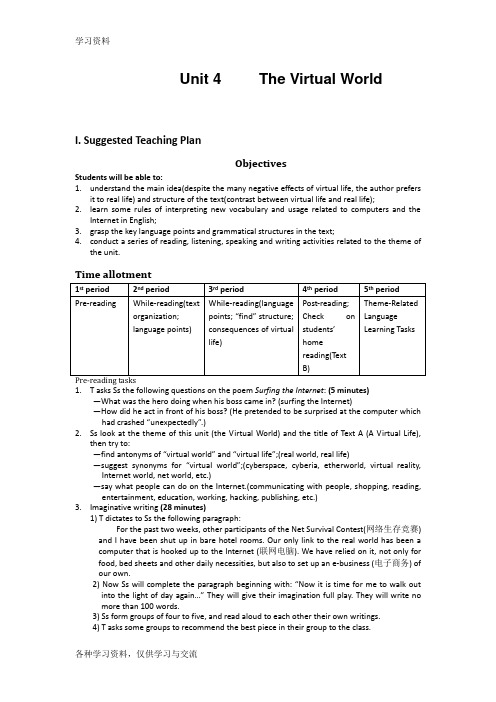
Unit 4 The Virtual WorldI. Suggested Teaching PlanObjectivesStudents will be able to:1.understand the main idea(despite the many negative effects of virtual life, the author prefersit to real life) and structure of the text(contrast between virtual life and real life);2.learn some rules of interpreting new vocabulary and usage related to computers and theInternet in English;3.grasp the key language points and grammatical structures in the text;4.conduct a series of reading, listening, speaking and writing activities related to the theme ofthe unit.Time allotment1.T asks Ss the following questions on the poem Surfing the Internet: (5 minutes)—What was the hero doing when his boss came in? (surfing the Internet)—How did he act in front of his boss? (He pretended to be surprised at the computer which had crashed “unexpectedly”.)2.Ss look at the theme of this unit (the Virtual World) and the title of Text A (A Virtual Life),then try to:—find antony ms of “virtual world” and “virtual life”;(real world, real life)—suggest synonyms for “virtual world”;(cyberspace, cyberia, etherworld, virtual reality, Internet world, net world, etc.)—say what people can do on the Internet.(communicating with people, shopping, reading, entertainment, education, working, hacking, publishing, etc.)3.Imaginative writing (28 minutes)1) T dictates to Ss the following paragraph:For the past two weeks, other participants of the Net Survival Contest(网络生存竞赛) and I have been shut up in bare hotel rooms. Our only link to the real world has been a computer that is hooked up to the Internet (联网电脑). We have relied on it, not only for food, bed sheets and other daily necessities, but also to set up an e-business (电子商务) of our own.2) Now Ss will complete the paragraph beginning with: “Now it is time for me to walk outinto the light of day again…” They will give their imagination full play. They will write no more than 100 words.3) Ss form groups of four to five, and read aloud to each other their own writings.4) T asks some groups to recommend the best piece in their group to the class.4.T may lead in to Text A by saying: Some of us like to live a life in contact with real things andreal people, but others favor a virtual exist ence. Which life is better? I’m sure you have different opinions. Now let’s read Text A to find out what Maia Szalavitz has to say about these two life styles. (2 minutes)While-reading tasks1.Text organization (15 minutes)1)T draws Ss’ attention to Text Org anization Exercise 1, and lets them read its instructionas well as what has already been done for them in this exercise.2)Ss try to complete the exercise by simply reading the sentence of each paragraph in TextA.3)Ss compare answers with each other; if necessary, T may help.2.T explains the key language points and gives Ss practice (Language study). (45 minutes)3.T guides Ss through Structure Exercise 2. (10 minutes)4.Ss re-read Paras 4-10, work in pairs to find out consequences of “my” virtual life. Can theyuse the “find oneself + adj./past participle/present participle” structure when summing up the consequences? (10 minutes)5.Some pairs report to the class their findings, using the “find” structure. (5 minutes)Post reading tasksputer-related vocabulary items (20 minutes)1)Ss scan Text A to find out vocabulary items to computer and the Internet. (They are:virtual life, the net, telecommuter, email, Internet mailing lists, computer-assisted, data, link, cyber-interaction, on line, system cash, click on the modem, connection, password)2)T tells Ss that new terms related to computer and the Internet are constantly added tothe English vocabulary, so much so that many of them are not included in any English dictionary. However, if we apply certain rules, their meanings are easy to deduce.3)T gives Ss more examples of computer-related vocabulary items (see Text Analysis)2.T guides Ss through some after-text exercises. (25 minutes)3.T checks on Ss’ home reading (Text B). (3 minutes)4.Ss do Part IV: Theme-Related Language Learning Tasks. (1 period)5.T asks Ss to prepare the next unit: (2 minutes)1)do the pre-reading task2)preview Text A.II. Text AnalysisThe most dynamic combining forms/prefixes for new computer-and-Internet-related vocabulary in /English are cyber-, virtual, net- (net-), Web- (web-), and E- (e-).New English vocabulary items derived from them usually appear in the following forms:bining forms/prefixes+ noun: this is the most common type, e.g. virtual life(虚拟生活),virtual world(虚拟世界)virtual reality(虚拟现实),cyber-interaction(网络互动),cyberculture(网络文化), cybernut(网虫),cyberpet(电子宠物),cyberspace(网络空间), netwriter(放送电子邮件的人), nethead(网虫), Webmaster(网站维护者), Web page(网页), Website(网站), WebTV(网络电视机),E-book(电子书籍),E-shopper (网上购物者), e-card(电子贺卡),e-journal(电子杂志),e-business(电子商务), e-cash (电子货币), e-commerce(电子商务).bining forms/prefixes + verb: e.g. cybersurf(网络漫游), netsurf(网络漫游), websurf,(网络漫游),email (发送电子邮件)3.words like cyber, net, etc. + suffix: e.g. cyberian(网络用户),cyberphobia(电脑恐惧症)cybernaut (网络用户),netter(网民)Webify(使万维网化)cyberize(使联网)4.clipped word: cyberdoc(网络医生),Netcast(网络播放), Netiquette(网规), Netizen(网民),Netpreneur(网络企业家)Webcam(网络摄象机),Webcasting(网络播放)Webliography(网络书目), Webnomics(网络经济),Webzine网络杂志),e- tailing (电子零售), e-zine(电子杂志).III. Cultural Notes1.The Internet:an international computer network for the exchange of information. It wasoriginally used mainly in the academic and military worlds but has since become available to the large and increasing number of people with personal computers. Other services, e.g. the World Wide Web, are available through it.The Internet is changing our lives and a parallel universe is rapidly emerging online. Today there is scarcely an aspect of our life that isn’t being upended by the torrent of information available on the hundreds of millions of sites crowding the Internet, not to mention its saving companies billions of dollars in producing goods and serving the needs of their customers.Nothing like it has been seen since the beginning of the Industrial Revolution, when power-driven machines began producing more in a day than men could turn out in nearly a year. The Internet and e-commerce are viewed as a global megatrend along the lines of the printing press, the telephone, the computer and the electricity.You would be hard pressed to name something that isn’t available on the Internet.Consider: books, health care, movie tickets, baby clothes, stocks, real estate, toys and airline tickets. American kids today are so computer savvy that it virtually ensures the United States will remain the unchallenged leader in cyberspace for the foreseeable future. Most kids use computers to play games and have email chats with friends.What’s clear is that, whatever we like it or not, the Internet is an ever-growing part of our lives and there is no turning back.2.NBC (the National Broadcasting Company):the first of the original three US nationalbroadcasting companies. It was established in 1926 by Radio Corporation of America as two groups of radio stations. The first NBC television channel opened in 1940. The company is now owned by General Electric. Its main offices are at Rockefeller Center in New York.3.PBS ( the Public Broadcasting Services):(in the US) a television system that broadcastsprograms to an association of local stations which use no television advertisements and do not make a profit. It was established by the Public Broadcasting Act and is supported by money from the US Government, large companies and the public. PBS is known for the high quality of its programs.4.ABC ( the American Broadcasting Company):one of the original three major televisionnetworks in American. It began in 1943 as the Blue Networks of six radio stations. ABC is now owned by the Walt Disney Company.IV. Language Study1.virtual: 1) created and existing only in a computer 虚拟的can visit a virtual store and put what I want in my basket at the click of a mouse button. Some people spend too much time escaping from reality into the virtual world conjuring up on their computer screens.2) being or acting as what is described, but not accepted as such in name or officially 差不多的,实质上的He claimed to be a virtual prisoner in his own home.The world’s governments have done virtually nothing to combat the threat of nuclear accidents.virtual world 虚拟世界virtual community虚拟社区virtual pet虚拟宠物virtual reality 虚拟现实2.interpret: 1) make clear the meaning of (either in words or by artistic performance) 解释,说明Poetry helps to interpret life.The professor tried to interpret the difficult passage in the book.2) consider to be the meaning of 认为是……的意思She interprets the dream as an unconscious desire to be young again.We interpreted his silence as a refusal.They are worried that the students might interpret the new regulation as a restriction of their rights.3) translate what is said in one language into another 作口译No one in the tour group spoke Spanish so we had to ask the guide to interpret.He worked as a interpreter at the UN’ s World Summit on Sustainable Development.他在联合国可持续发展大会上担任口译。
大学英语综合教程2unit4教案
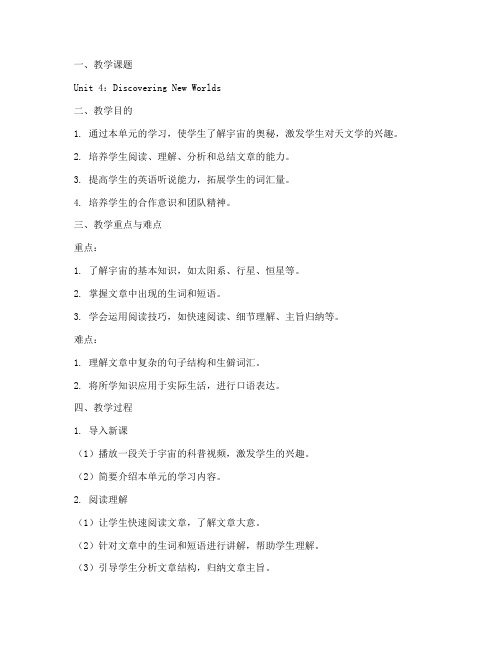
一、教学课题Unit 4:Discovering New Worlds二、教学目的1. 通过本单元的学习,使学生了解宇宙的奥秘,激发学生对天文学的兴趣。
2. 培养学生阅读、理解、分析和总结文章的能力。
3. 提高学生的英语听说能力,拓展学生的词汇量。
4. 培养学生的合作意识和团队精神。
三、教学重点与难点重点:1. 了解宇宙的基本知识,如太阳系、行星、恒星等。
2. 掌握文章中出现的生词和短语。
3. 学会运用阅读技巧,如快速阅读、细节理解、主旨归纳等。
难点:1. 理解文章中复杂的句子结构和生僻词汇。
2. 将所学知识应用于实际生活,进行口语表达。
四、教学过程1. 导入新课(1)播放一段关于宇宙的科普视频,激发学生的兴趣。
(2)简要介绍本单元的学习内容。
2. 阅读理解(1)让学生快速阅读文章,了解文章大意。
(2)针对文章中的生词和短语进行讲解,帮助学生理解。
(3)引导学生分析文章结构,归纳文章主旨。
3. 练习巩固(1)让学生完成课后练习,巩固所学知识。
(2)进行小组讨论,让学生分享自己的看法和感受。
4. 口语表达(1)让学生用所学词汇和短语描述自己心中的宇宙。
(2)组织学生进行角色扮演,模拟天文馆参观场景。
5. 总结与作业(1)对本节课所学内容进行总结,强调重点和难点。
(2)布置课后作业,要求学生阅读相关资料,了解更多关于宇宙的知识。
五、课时分配1. 导入新课:10分钟2. 阅读理解:30分钟3. 练习巩固:20分钟4. 口语表达:20分钟5. 总结与作业:10分钟六、教学手段、教具1. 教学手段:多媒体、黑板、PPT2. 教具:教材、练习册、科普视频、图片等七、板书设计1. Unit 4:Discovering New Worlds2. 天文学基本知识3. 生词和短语4. 阅读技巧5. 口语表达八、课后分析及教学参考资料1. 教师可根据学生的实际情况,调整教学内容和进度。
2. 教学参考资料:天文学相关书籍、网站、视频等。
Unit_4__The_Virtual_World(全新版大学英语第二册(综合英语)
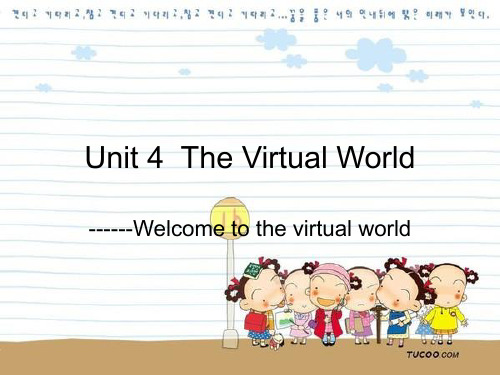
数字谐音大全
01925:你依旧爱我 04551:你是我唯一 0456: 你是我的 0487:你是白痴 065:原谅我 1573:一往情深 1372:一厢情愿 234:爱相随 282:饿不饿 300:想你哦 356:上网啦 3731:真心真意 4456:速速回来 456:是我啦 48:是吧 546:我输了 57350:我只在乎你 58:晚安 6868:溜吧溜吧 9213:钟爱一生
Unit 4 The Virtual World
------Welcome to the virtual world
虚拟世界是以计算机模拟环境为 基础,以虚拟的人物化身为载体,用 户在其中生活、交流的网络世界。在 虚拟世界我们可以 studying,chatting,playing games ,shopping,watching movies, 甚至committing crimes
STUDYING
CHATTING
SHOPPING
网络新词
------指“网络用语”, 即多在网络上流行的 非正式语言。多为谐 音、错别字改成,也 有象形字词。
新词图片
新型歇后语
• 乐 一 乐 不 叫 乐 一 乐 , 叫 happy ! 叫 ----------愚 见 。 。 。 , 叫 ----------兄 台 法 哥 , 叫 ----------, 叫 , 叫 ------晕 ----------看 叫 大 见 面 , 懂 满 不 不 叫 叫 不 看 法 哥 不 不 叫 不 叫 强 叫 弓 虽 叫 酱 紫 叫 强 , ---• 看 • 大 见 面 不 满 不 懂 叫 好 不 叫 这 样 子 , ---叫 稀 饭 欢 要 叫 表 叫 虾 米 强 , ---, ---喜 不 么 叫 小 , ---, ---不 叫 子 叫 叫 什 蟑 岁 螂 叫 人 叫 小 孩 , ------年 轮 , ---数 年 轻 叫 • 聚 会 。 • 不 靠 • 看 强 不 。 • • 好 样 欢 要 不 不 叫 不 叫 • 这 • 喜 不 么 不 叫 不 叫 偶 • • 什 蟑 岁 螂 不 数 轻 人 我 , ---叫 • • • 年 不 P • 我Fra bibliotek新词解释
外教社全大学英语综合教程第二册第四单元课后练习答案unitbook
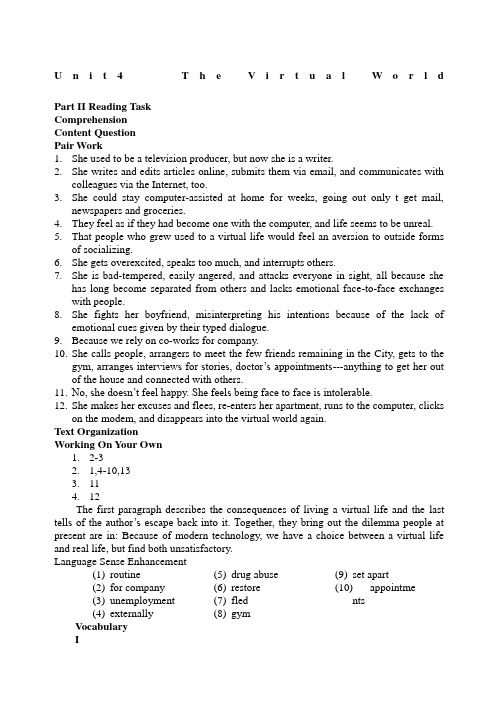
U n i t4T h e V i r t u a l W o r l d Part II Reading TaskComprehensionContent QuestionPair Work1.She used to be a television producer, but now she is a writer.2.She writes and edits articles online, submits them via email, and communicates withcolleagues via the Internet, too.3.She could stay computer-assisted at home for weeks, going out only t get mail,newspapers and groceries.4.They feel as if they had become one with the computer, and life seems to be unreal.5.That people who grew used to a virtual life would feel an aversion to outside formsof socializing.6.She gets overexcited, speaks too much, and interrupts others.7.She is bad-tempered, easily angered, and attacks everyone in sight, all because shehas long become separated from others and lacks emotional face-to-face exchanges with people.8.She fights her boyfriend, misinterpreting his intentions because of the lack ofemotional cues given by their typed dialogue.9.Because we rely on co-works for company.10.She calls people, arrangers to meet the few friends remaining in the City, gets to thegym, arranges interviews for stories, doctor’s appointments---anything to get her out of the house and connected with others.11.No, she doesn’t feel happy. She feels being face to face is intolerable.12.She makes her excuses and flees, re-enters her apartment, runs to the computer, clickson the modem, and disappears into the virtual world again.Text OrganizationWorking On Your Own1.2-32.1,4-10,133.114.12The first paragraph describes the consequences of living a virtual life and the last tells of the author’s escape back into it. Together, they bring out the dilemma people at present are in: Because of modern technology, we have a choice between a virtual life and real life, but find both unsatisfactory.Language Sense Enhancement(1)routine(2)for company(3)unemployment(4)externally (5)drug abuse(6)restore(7)fled(8)gym(9)set apart(10)appointmentsVocabulary I1)conversely2)but then3)symptom4)spitting 5)abusing6)tone7)took; in8)editing9)have arranged10)in sight11)stretched12)data1)smoking cigarettes jars on me.2)find themselves getting sucked in.3)has arranged for a technician from the computer store to check andrepair it.4)fled their country to avoid military service/fled to other countries toavoid military service.5)restore people’s confidence in it.1)the virtual; on line; via2)nightmare; routine; any appointment; arrange for3)cue; remarks; his tuneI.Collocation1.We came here all the way on foot.2.Private cars are not allowed on campus.3.They are on vacation in Florida.4.Mary has been talking to her friend on the phone for an hour.5.Don’t worry, Lucy is always on time.6.Industrial demand on fuel is on the rise.age1.hard2.difficult3.impossible4.tough5.hard6.easyprehensive Exercises IV.cloze(1)Internet(2)click(3)virtual(4)routines(5)arrange(6)nightmare (7)annoying(8)connection(9)crawls(10)take in(11)spit(12)data(13)sucked into(14)At times(15)flee(16)on line(1)companion(2)deliver(3)access(4)enables(5)customers(6)delights(7)provides(8)small(9)remote(10)informationV.Translation1)Research shows that laughter can bring a lot of health benefits.2) A show Internet connection speed is really annoying.3)As the law stands, helping someone commit suicide is a crime.4)In her report, Mary tries to interpret the data from a completelydifferent angle.5)Sue is a girl of great talent. Her amazing memory sets her apart fromher classmates.Perhaps you envy me for being able to work from home on the computer. I agree that the Internet has made my job a lot easier. I can write, submit and edit articles via email, chat with my colleagues on line and discuss work with my boss. With a click of the mouse, I can get all the data I need and keep up with the latest news. But then, communicating through the Net can be frustrating at times. The system may crash. Worse still, without the emotional cues of face-to-face communication, the typed words sometimes seem difficult to interpret.。
外教社全新版大学英语综合教程第二册第四单元课后练习答案unitbook

外教社全新版大学英语综合教程第二册第四单元课后练习答案u n i t b o o kTYYGROUP system office room 【TYYUA16H-TYY-TYYYUA8Q8-U n i t4T h e V i r t u a l W o r l dPart II Reading TaskComprehensionContent QuestionPair Work1.She used to be a television producer, but now she is a writer.2.She writes and edits articles online, submits them via email, andcommunicates with colleagues via the Internet, too.3.She could stay computer-assisted at home for weeks, going out only tget mail, newspapers and groceries.4.They feel as if they had become one with the computer, and life seemsto be unreal.5.That people who grew used to a virtual life would feel an aversion tooutside forms of socializing.6.She gets overexcited, speaks too much, and interrupts others.7.She is bad-tempered, easily angered, and attacks everyone in sight, allbecause she has long become separated from others and lacks emotional face-to-face exchanges with people.8.She fights her boyfriend, misinterpreting his intentions because of thelack of emotional cues given by their typed dialogue.9.Because we rely on co-works for company.10.She calls people, arrangers to meet the few friends remaining in theCity, gets to the gym, arranges interviews for stories, doctor’sappointments---anything to get her out of the house and connected with others.11.No, she doesn’t feel happy. She feels being face to face isintolerable.12.She makes her excuses and flees, re-enters her apartment, runs to thecomputer, clicks on the modem, and disappears into the virtual world again.Text OrganizationWorking On Your Own1.2-32.1,4-10,133.114.12The first paragraph describes the consequences of living a virtuallife and the last tells of the author’s escape back into it. Together, they bring out the dilemma people at present are in: Because of modern technology, we have a choice between a virtual life and real life, butfind both unsatisfactory.Language Sense Enhancement(1)routine(2)for company(3)unemployment (4)externally(5)drug abuse(6)restore(7)fled(8)gym(9)set apart(10)appointm ents VocabularyI1)conversely2)but then3)symptom4)spitting 5)abusing6)tone7)took; in8)editing9)have arranged10)in sight11)stretched12)data1)smoking cigarettes jars on me.2)find themselves getting sucked in.3)has arranged for a technician from the computer store to checkand repair it.4)fled their country to avoid military service/fled to othercountries to avoid military service.5)restore people’s confidence in it.1)the virtual; on line; via2)nightmare; routine; any appointment; arrange for3)cue; remarks; his tuneI.Collocation1.We came here all the way on foot.2.Private cars are not allowed on campus.3.They are on vacation in Florida.4.Mary has been talking to her friend on the phone for an hour.5.Don’t worry, Lucy is always on time.6.Industrial demand on fuel is on the rise.age1.hard2.difficult3.impossible4.tough5.hard6.easyprehensive Exercises IV.cloze(1)Internet(2)click(3)virtual(4)routines(5)arrange(6)nightmare (7)annoying(8)connection(9)crawls(10)take in(11)spit(12)data(13)suckedinto(14)At times(15)flee(16)on line(1)companion(2)deliver(3)access(4)enables(5)customers(6)delights(7)provides(8)small (9)remote(10)informationV.Translation1)Research shows that laughter can bring a lot of health benefits.2)A show Internet connection speed is really annoying.3)As the law stands, helping someone commit suicide is a crime.4)In her report, Mary tries to interpret the data from acompletely different angle.5)Sue is a girl of great talent. Her amazing memory sets herapart from her classmates.Perhaps you envy me for being able to work from home on the computer. I agree that the Internet has made my job a lot easier. I can write, submit and edit articles via email, chat with mycolleagues on line and discuss work with my boss. With a click of the mouse, I can get all the data I need and keep up with the latest news. But then, communicating through the Net can be frustrating at times. The system may crash. Worse still, without the emotional cues offace-to-face communication, the typed words sometimes seem difficultto interpret.。
全新版大学英语综合教程第二册Unit4
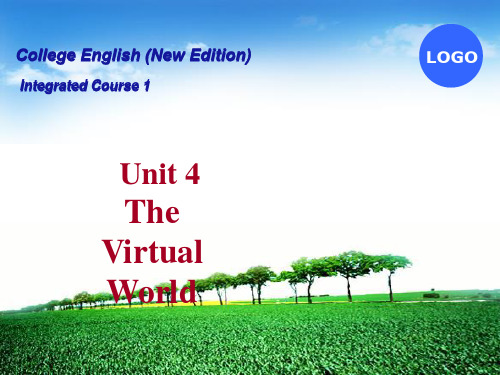
Pre-reading Tasks
Let’s watch a fragment of a movie (The Matrix) with 3 questions.
Detailed Reading
the Key Language Points
Globe Reading
1 Text Organization
Try to complete the Text Organization Exercise by simply reading the first sentence of each paragraph in Text A.
Globe Reading
Further Understanding:
1) Read part I carefully and answer the following questions: What did the author do three years ago and what is she doing now? (She worked as a TV producer, and communicates with colleagues on Internet mailing lists.) How does the author manage her daily life? (She can order food, and manage her money, love and work on the Net.)
上海外语教育出版社大学英语综合教程2 unit4 The virtual world精品PPT课件
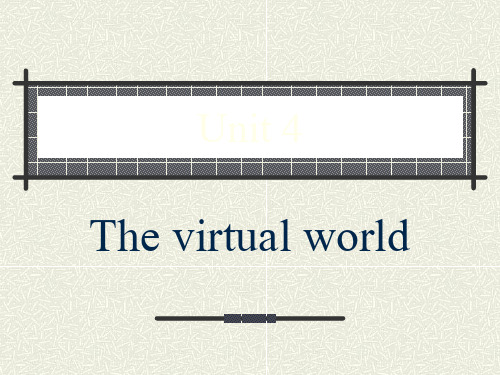
With the help of the Internet and the popularization of computers, shopping on the Internet has become a commonplace in our life. Here consumers can buy almost everything they need.
However, shopping on the Internet also has its disadvantages. The first disadvantage is that the consumers can't see the goods or try them on personally. Sometimes, the real goods may not be the same as what they have seen on the computer. The second disadvantage is that some shops on the Internet are not registered. These shops merely aim at defrauding the customers of their money.
Shopping on the Internet has a lot of advantages, of which the most important is perhaps its convenience. People don't have to waste a lot of their energy and precious time to go from one shop to another to choose the commodities they like. This is especially desirable to the old, the sick and the busy people who cannot go to the shops in person. The goods come in all shapes, sizes and colors on the Internet. All they need to do is to sit in front of their computers and click the mouse.
全新版大学英语综合教程第二册第四单元课后练习答案unit 4 book 2
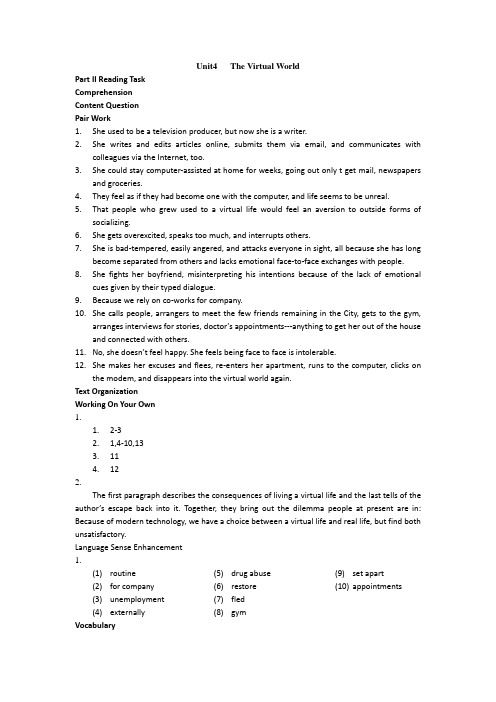
Unit4 The Virtual WorldPart II Reading TaskComprehensionContent QuestionPair Work1.She used to be a television producer, but now she is a writer.2.She writes and edits articles online, submits them via email, and communicates withcolleagues via the Internet, too.3.She could stay computer-assisted at home for weeks, going out only t get mail, newspapersand groceries.4.They feel as if they had become one with the computer, and life seems to be unreal.5.That people who grew used to a virtual life would feel an aversion to outside forms ofsocializing.6.She gets overexcited, speaks too much, and interrupts others.7.She is bad-tempered, easily angered, and attacks everyone in sight, all because she has longbecome separated from others and lacks emotional face-to-face exchanges with people.8.She fights her boyfriend, misinterpreting his intentions because of the lack of emotionalcues given by their typed dialogue.9.Because we rely on co-works for company.10.She calls people, arrangers to meet the few friends remaining in the City, gets to the gym,arranges interviews for stories, doctor’s appointments---anything to get her out of the house and connected with others.11.No, she doesn’t feel happy. She feels being face to face is intolerable.12.She makes her excuses and flees, re-enters her apartment, runs to the computer, clicks onthe modem, and disappears into the virtual world again.Text OrganizationWorking On Your Own1.1.2-32.1,4-10,133.114.122.The first paragraph describes the consequences of living a virtual life and the last tells of the author’s escape back into it. Together, they bring out the dilemma people at present are in: Because of modern technology, we have a choice between a virtual life and real life, but find both unsatisfactory.Language Sense Enhancement1.(1)routine(2)for company(3)unemployment(4)externally (5)drug abuse(6)restore(7)fled(8)gym(9)set apart(10)appointmentsVocabularyI 1.1)conversely2)but then3)symptom4)spitting 5)abusing6)tone7)took; in8)editing9)have arranged10)in sight11)stretched12)data2.1)smoking cigarettes jars on me.2)find themselves getting sucked in.3)has arranged for a technician from the computer store to check and repair it.4)fled their country to avoid military service/fled to other countries to avoid militaryservice.5)restore people’s confidence in it.3.1)the virtual; on line; via2)nightmare; routine; any appointment; arrange for3)cue; remarks; his tuneI.Collocation1.We came here all the way on foot.2.Private cars are not allowed on campus.3.They are on vacation in Florida.4.Mary has been talking to her friend on the phone for an hour.5.Don’t worry, Lucy is always on time.6.Industrial demand on fuel is on the rise.age1.hard2.difficult3.impossible4.tough5.hard6.easyprehensive Exercises IV.cloze1.(1)Internet(2)click(3)virtual(4)routines(5)arrange(6)nightmare (7)annoying(8)connection(9)crawls(10)take in(11)spit(12)data(13)sucked into(14)At times(15)flee(16)on line2.(1)companion(2)deliver(3)access(4)enables(5)customers(6)delights(7)provides (8)small(9)remote(10)informationV.Translation1.1)Research shows that laughter can bring a lot of health benefits.2) A show Internet connection speed is really annoying.3)As the law stands, helping someone commit suicide is a crime.4)In her report, Mary tries to interpret the data from a completely different angle.5)Sue is a girl of great talent. Her amazing memory sets her apart from her classmates. 2.Perhaps you envy me for being able to work from home on the computer. I agree that the Internet has made my job a lot easier. I can write, submit and edit articles via email, chat with my colleagues on line and discuss work with my boss. With a click of the mouse, I can get all the data I need and keep up with the latest news. But then, communicating through the Net can be frustrating at times. The system may crash. Worse still, without the emotional cues of face-to-face communication, the typed words sometimes seem difficult to interpret.。
全新版大学英语第二册教案Unit4TheVirtualWorld.doc
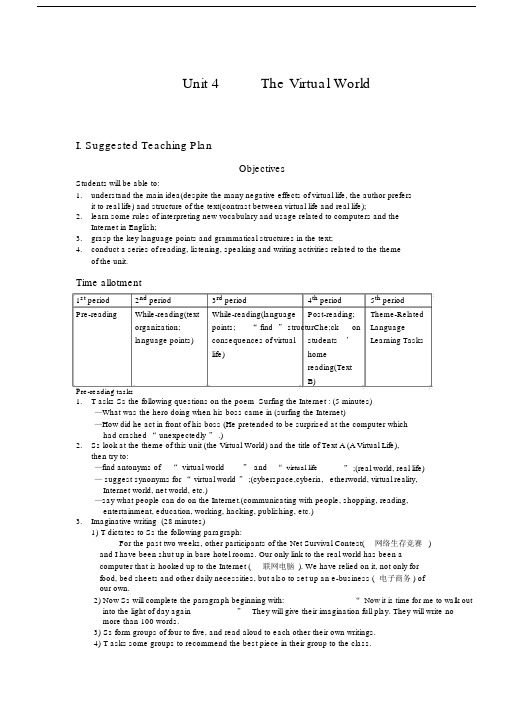
Unit 4The Virtual WorldI. Suggested Teaching PlanObjectivesStudents will be able to:1.understand the main idea(despite the many negative effects of virtual life, the author prefersit to real life) and structure of the text(contrast between virtual life and real life);2.learn some rules of interpreting new vocabulary and usage related to computers and theInternet in English;3.grasp the key language points and grammatical structures in the text;4.conduct a series of reading, listening, speaking and writing activities related to the themeof the unit.Time allotment1st period 2nd period 3rd period 4th period 5th periodPre-reading While-reading(text While-reading(language Post-reading; Theme-Related organization; points; “ find ” structurCh e;ck on Languagelanguage points) consequences of virtual students ’Learning Taskslife) homereading(TextB)Pre-reading tasks1.T asks Ss the following questions on the poem Surfing the Internet : (5 minutes)—What was the hero doing when his boss came in (surfing the Internet)—How did he act in front of his boss (He pretended to be surprised at the computer which had crashed “ unexpectedly ” .)2.Ss look at the theme of this unit (the Virtual World) and the title of Text A (A Virtual Life),then try to:—find antonyms of“ virtual world” and“ virtual life — suggest synonyms for “ virtual world ” ;(cyberspace,cyberia, Internet world, net world, etc.)” ;(real world, real life) etherworld, virtual reality,—say what people can do on the Internet.(communicating with people, shopping, reading, entertainment, education, working, hacking, publishing, etc.)3.Imaginative writing (28 minutes)1)T dictates to Ss the following paragraph:For the past two weeks, other participants of the Net Survival Contest(网络生存竞赛) and I have been shut up in bare hotel rooms. Our only link to the real world has been acomputer that is hooked up to the Internet (联网电脑). We have relied on it, not only forfood, bed sheets and other daily necessities, but also to set up an e-business ( 电子商务 ) ofour own.2) Now Ss will complete the paragraph beginning with:“ Now it is time for me to walk outinto the light of day again” They will give their imagination full play. They will write nomore than 100 words.3)Ss form groups of four to five, and read aloud to each other their own writings.4)T asks some groups to recommend the best piece in their group to the class.4.T may lead in to Text A by saying: Some of us like to live a life in contact with real things andreal people, but others favor a virtual existence. Which life is better I ’ msure you have differentopinions. Now let ’reads Text A to find out what Maia Szalavitz has to say about these two lifestyles. (2 minutes)While-reading tasks1.Text organization (15 minutes)1)T draws Ss ’ attention to Text Organization Exercise 1, and lets them read itsinstruction as well as what has already been done for them in this exercise.2)Ss try to complete the exercise by simply reading the sentence of each paragraph inText A.3)Ss compare answers with each other; if necessary, T may help.2.T explains the key language points and gives Ss practice (Language study). (45 minutes)3.T guides Ss through Structure Exercise 2. (10 minutes)4. Ss re-read Paras 4-10, work in pairs to find out consequences of “ my” virtual life. Can theyuse the “ find oneself + adj./past participle/present participle ” structure when summing up the consequences (10 minutes)5. Some pairs report to the class their findings, using the (5 minutes)“find ” structure.Post reading tasks1. Computer-related vocabulary items (20 minutes)1)Ss scan Text A to find out vocabulary items to computer and the Internet. (They are: virtuallife, the net, telecommuter, email, Internet mailing lists, computer-assisted, data, link,cyber-interaction, on line, system cash, click on the modem, connection, password)2)T tells Ss that new terms related to computer and the Internet are constantly added tothe English vocabulary, so much so that many of them are not included in any Englishdictionary. However, if we apply certain rules, their meanings are easy to deduce.3)T gives Ss more examples of computer-related vocabulary items (see Text Analysis)2.T guides Ss through some after-text exercises. (25 minutes)3.T checks on Ss ’ home reading(Text B). (3 minutes)4.Ss do Part IV: Theme-Related Language Learning Tasks(1. period)5.T asks Ss to prepare the next unit: (2 minutes)1)do the pre-reading task2)preview Text A.II. Text AnalysisThe most dynamic combining forms/prefixes for new computer-and-Internet-relatedvocabulary in /English are cyber-, virtual, net- (net-), Web- (web-), and E- (e-).New English vocabulary items derived from them usually appear in the following forms:1. combining forms/prefixes+ noun: this is the most common type, . virtual life (虚拟生活),virtual world (虚拟世界) virtual reality (虚拟现实) ,cyber-interaction (网络互动) ,cyberculture (网络文化) , cybernut (网虫) ,cyberpet (电子宠物) ,cyberspace(网络空间) , netwriter (放送电子邮件的人) , nethead(网虫) , Webmaster(网站维护者) , Webpage(网页), Website(网站), WebTV(网络电视机),E-book(电子书籍),E-shopper(网上购物者) , e-card(电子贺卡) ,e-journal(电子杂志) ,e-business(电子商务) , e-cash(电子货币) , e-commerce (电子商务) .bining forms/prefixes + verb: . cybersurf (网络漫游) , netsurf(网络漫游) , websurf,(网络漫游), email (发送电子邮件)3.words like cyber, net, etc. + suffix: . cyberian( 网络用户 ), cyberphobia (电脑恐惧症)cybernaut ( 网络用户 ),netter (网民)Webify (使万维网化)cyberize(使联网)4.clipped word: cyberdoc (网络医生), Netcast(网络播放) , Netiquette (网规) , Netizen(网民), Netpreneur (网络企业家) Webcam(网络摄象机), Webcasting(网络播放) Webliography(网络书目) , Webnomics(网络经济), Webzine 网络杂志), e- tailing(电子零售) , e-zine(电子杂志) .III. Cultural NotesInternet: an international computer network for the exchange of information. It was originallyused mainly in the academic and military worlds but has since become available to thelarge and increasing number of people with personal computers. Other services, . the WorldWide Web, are available through it.The Internet is changing our lives and a parallel universe is rapidly emerging online. Today there is scarcely an aspect of our life that isn ’ t being upended by the torrent of information available on the hundreds of millions of sites crowding the Internet, not to mention itssaving companies billions of dollars in producing goods and serving the needs of theircustomers. Nothing like it has been seen since the beginning of the Industrial Revolution, whenpower-driven machines began producing more in a day than men could turn out in nearly ayear. The Internet and e-commerce are viewed as a global megatrend along the lines of theprinting press, the telephone, the computer and the electricity.You would be hard pressed to name something that isn ’availablet on the Internet.Consider: books, health care, movie tickets, baby clothes, stocks, real estate, toys and airlinetickets. American kids today are so computer savvy that it virtually ensures the United Stateswill remain the unchallenged leader in cyberspace for the foreseeable future. Most kids usecomputers to play games and have email chats with friends.What’ s clear is that, whatever we like it or not, the Internet is an ever-growing part of our lives and there is no turning back.2.NBC (the National Broadcasting Company): the first of the original three US nationalbroadcasting companies. It was established in 1926 by Radio Corporation of America as twogroups of radio stations. The first NBC television channel opened in 1940. The company is nowowned by General Electric. Its main offices are at Rockefeller Center in New York.3.PBS ( the Public Broadcasting Services): (in the US) a television system that broadcastsprograms to an association of local stations which use no television advertisements and donot make a profit. It was established by the Public Broadcasting Act and is supported by moneyfrom the US Government, large companies and the public. PBS is known for the high quality ofits programs.4.ABC ( the American Broadcasting Company): one of the original three major televisionnetworks in American. It began in 1943 as the Blue Networks of six radio stations. ABC is nowowned by the Walt Disney Company.IV. Language Study: 1) created and existing only in a computer虚拟的can visit a virtual store and put what I want in my basket at the click of a mouse button.Some people spend too much time escaping from reality into the virtual world conjuring up ontheir computer screens.2) being or acting as what is described, but not accepted as such in name or officially差不多的,实质上的He claimed to be a virtual prisoner in his own home.The world ’governments have done virtually nothing to combat the threat accidents.virtual world虚拟世界virtual community虚拟社区virtual pet virtual reality虚拟现实: 1) make clear the meaning of (either in words or by artistic performance)解释,说明Poetry helps to interpret life.The professor tried to interpret the difficult passage in the book.2) consider to be the meaning of认为是的意思of nuclear 虚拟宠物She interprets the dream as an unconscious desire to be young again.We interpreted his silence as a refusal.They are worried that the students might interpret the new regulation as a restriction of their rights.3) translate what is said in one language into another作口译No one in the tour group spoke Spanish so we had to ask the guide to interpret.He worked as a interpreter at the UN’ s World Summit on Sustainable Development他在联合国.可持续发展大会上担任口译。
全新版大学英语综合教程第二册第四单元课后练习答案unit4
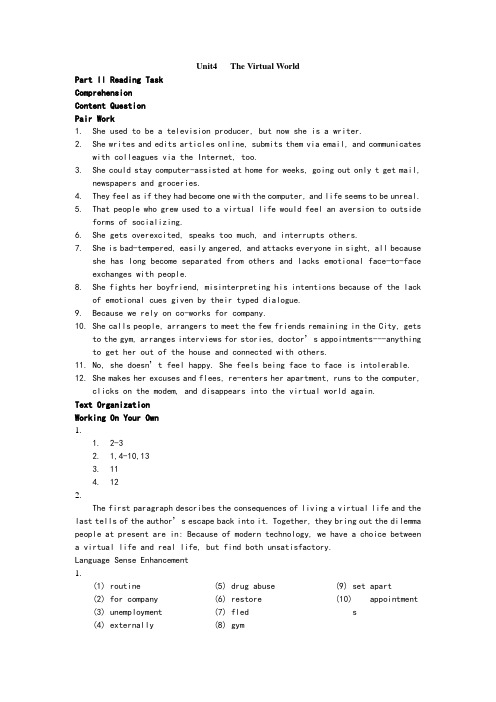
Unit4 The Virtual WorldPart II Reading TaskComprehensionContent QuestionPair Work1.She used to be a television producer, but now she is a writer.2.She writes and edits articles online, submits them via email, and communicateswith colleagues via the Internet, too.3.She could stay computer-assisted at home for weeks, going out only t get mail,newspapers and groceries.4.They feel as if they had become one with the computer, and life seems to be unreal.5.That people who grew used to a virtual life would feel an aversion to outsideforms of socializing.6.She gets overexcited, speaks too much, and interrupts others.7.She is bad-tempered, easily angered, and attacks everyone in sight, all becauseshe has long become separated from others and lacks emotional face-to-face exchanges with people.8.She fights her boyfriend, misinterpreting his intentions because of the lackof emotional cues given by their typed dialogue.9.Because we rely on co-works for company.10.She calls people, arrangers to meet the few friends remaining in the City, getsto the gym, arranges interviews for stories, doctor’s appointments---anything to get her out of the house and connected with others.11.No, she doesn’t feel happy. She feels being face to face is intolerable.12.She makes her excuses and flees, re-enters her apartment, runs to the computer,clicks on the modem, and disappears into the virtual world again.Text OrganizationWorking On Your Own1.1.2-32.1,4-10,133.114.122.The first paragraph describes the consequences of living a virtual life and the last tells of the author’s escape back into it. Together, they bring out the dilemma people at present are in: Because of modern technology, we have a choice between a virtual life and real life, but find both unsatisfactory.Language Sense Enhancement1.(1)routine(2)for company(3)unemployment(4)externally (5)drug abuse(6)restore(7)fled(8)gym(9)set apart(10)appointmentsVocabulary I1.1)conversely2)but then3)symptom4)spitting 5)abusing6)tone7)took; in8)editing9)have arranged10)in sight11)stretched12)data2.1)smoking cigarettes jars on me.2)find themselves getting sucked in.3)has arranged for a technician from the computer store to check and repairit.4)fled their country to avoid military service/fled to other countries toavoid military service.5)restore people’s confidence in it.3.1)the virtual; on line; via2)nightmare; routine; any appointment; arrange for3)cue; remarks; his tuneI.Collocation1.We came here all the way on foot.2.Private cars are not allowed on campus.3.They are on vacation in Florida.4.Mary has been talking to her friend on the phone for an hour.5.Don’t worry, Lucy is always on time.6.Industrial demand on fuel is on the rise.age1.hard2.difficult3.impossible4.tough5.hard6.easyprehensive Exercises IV.cloze1.(1)Internet(2)click(3)virtual(4)routines(5)arrange(6)nightmare (7)annoying(8)connection(9)crawls(10)take in(11)spit(12)data(13)sucked into(14)At times(15)flee(16)on line2.(1)companion(2)deliver(3)access(4)enables(5)customers (6)delights(7)provides(8)small(9)remote(10)informationV.Translation1.1)Research shows that laughter can bring a lot of health benefits.2) A show Internet connection speed is really annoying.3)As the law stands, helping someone commit suicide is a crime.4)In her report, Mary tries to interpret the data from a completely differentangle.5)Sue is a girl of great talent. Her amazing memory sets her apart from herclassmates.2.Perhaps you envy me for being able to work from home on the computer. I agree that the Internet has made my job a lot easier. I can write, submit and edit articles via email, chat with my colleagues on line and discuss work with my boss. With a click of the mouse, I can get all the data I need and keep up with the latest news. But then, communicating through the Net can be frustrating at times. The system may crash. Worse still, without the emotional cues of face-to-face communication, the typed words sometimes seem difficult to interpret.。
上海外语教育出版社大学英语综合教程2unit4Thevirtualworld
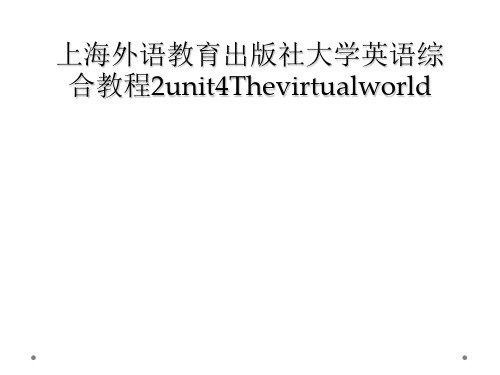
就会变得明显地焦躁不安、不可抑制地
想上网、时刻担心自己错过了什么,甚 至做梦也是关于网络;
2、你是否原打算只上网15分钟,但 最终竟超过4小时以上;
3、你每月的电话费单是否越来越长。 4、是不是自从你买了电脑,你的父
母、朋友、姐妹、兄弟、老板、恋人就 开始抱怨你成天不见人影。
Shopping on the Internet has a lot of advantages, of which the most important is perhaps its convenience. People don't have to waste a lot of their energy and precious time to go from one shop to another to choose the commodities they like. This is especially desirable to the old, the sick and the busy people who cannot go to the shops in person. The goods come in all shapes, sizes and colors on the Internet. All they need to do is to sit in front of their computers and click the mouse.
tone in : go well with
e.g. I think black shoes would tone in better with your coat.
6 fluid: not solid, not fixed, able to be changed; liquid
外教社全大学英语综合教程第二册第四单元课后练习答案unitbook
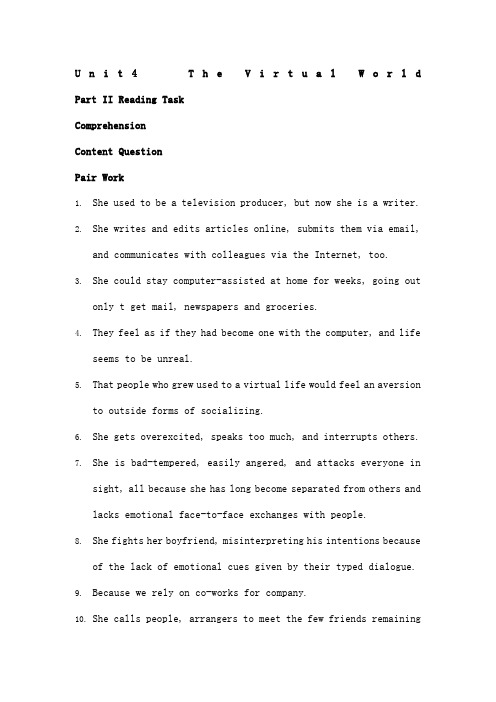
U n i t4T h e V i r t u a l W o r l d Part II Reading TaskComprehensionContent QuestionPair Work1.She used to be a television producer, but now she is a writer.2.She writes and edits articles online, submits them via email,and communicates with colleagues via the Internet, too.3.She could stay computer-assisted at home for weeks, going outonly t get mail, newspapers and groceries.4.They feel as if they had become one with the computer, and lifeseems to be unreal.5.That people who grew used to a virtual life would feel an aversionto outside forms of socializing.6.She gets overexcited, speaks too much, and interrupts others.7.She is bad-tempered, easily angered, and attacks everyone insight, all because she has long become separated from others and lacks emotional face-to-face exchanges with people.8.She fights her boyfriend, misinterpreting his intentions becauseof the lack of emotional cues given by their typed dialogue.9.Because we rely on co-works for company.10.She calls people, arrangers to meet the few friends remainingin the City, gets to the gym, arranges interviews for stories, doctor’s appointments---anything to get her out of the house and connected with others.11.No, she doesn’t feel happy. She feels being face to face isintolerable.12.She makes her excuses and flees, re-enters her apartment, runsto the computer, clicks on the modem, and disappears into the virtual world again.Text OrganizationWorking On Your Own1.1.2-32.1,4-10,133.114.122.The first paragraph describes the consequences of living a virtual life and the last tells of the author’s escape back into it. Together, they bring out the dilemma people at present are in: Because of modern technology, we have a choice between a virtual life and real life, but find both unsatisfactory.Language Sense Enhancement1.(1)routine(2)for company(3)unemployment(4)externally(5)drug abuse(6)restore (7)fled(8)gym(9)set apart(10)appointmentsVocabulary I1.1)conversely2)but then3)symptom4)spitting 5)abusing6)tone7)took; in8)editing9)have arranged10)in sight11)stretched12)data2.1)smoking cigarettes jars on me.2)find themselves getting sucked in.3)has arranged for a technician from the computer store to checkand repair it.4)fled their country to avoid military service/fled to othercountries to avoid military service.5)restore people’s confidence in it.3.1)the virtual; on line; via2)nightmare; routine; any appointment; arrange for3)cue; remarks; his tuneI.Collocation1.We came here all the way on foot.2.Private cars are not allowed on campus.3.They are on vacation in Florida.4.Mary has been talking to her friend on the phone for an hour.5.Don’t worry, Lucy is always on time.6.Industrial demand on fuel is on the rise.age1.hard2.difficult3.impossible4.tough5.hard6.easyprehensive Exercises IV.cloze1.(1)Internet(2)click(3)virtual(4)routines(5)arrange(6)nightmare (7)annoying(8)connection(9)crawls(10)take in(11)spit(12)data(13)suckedinto(14)At times(15)flee(16)on line2.(1)companion(2)deliver(3)access(4)enables(5)customers (6)delights(7)provides(8)small(9)remote(10)informationV.Translation1.1)Research shows that laughter can bring a lot of healthbenefits.2) A show Internet connection speed is really annoying.3)As the law stands, helping someone commit suicide is a crime.4)In her report, Mary tries to interpret the data from acompletely different angle.5)Sue is a girl of great talent. Her amazing memory sets herapart from her classmates.2.Perhaps you envy me for being able to work from home on the computer. I agree that the Internet has made my job a lot easier.I can write, submit and edit articles via email, chat with my colleagues on line and discuss work with my boss. With a click of the mouse, I can get all the data I need and keep up with the latest news. But then, communicating through the Net can be frustrating at times. The system may crash. Worse still, without the emotional cues of face-to-face communication, the typed words sometimes seem difficult to interpret.。
- 1、下载文档前请自行甄别文档内容的完整性,平台不提供额外的编辑、内容补充、找答案等附加服务。
- 2、"仅部分预览"的文档,不可在线预览部分如存在完整性等问题,可反馈申请退款(可完整预览的文档不适用该条件!)。
- 3、如文档侵犯您的权益,请联系客服反馈,我们会尽快为您处理(人工客服工作时间:9:00-18:30)。
Unit 4 The Virtual WorldTeaching Aims:1.Understanding the main idea and structure of the text.2.Deduce the meaning of new vocabulary related to computers and the Internet.3.Grasp the key language points in Text A and learn how to use them in context.4.Understand the cultural background related to the content.5.Express themselves more freely on the theme of The Virtual World after doing a series oftheme-related reading, listening, speaking, and writing activities6.Write e-mail message in an appropriate way.Teaching Keypoints:1.Grasp the main idea of Text A and language points in Text A2.Cultural background in Text A3.Analysis of the difficult sentences in Text ATeaching Difficulties:1.Writing strategy and style demonstrated in Text A2.Write an essay with an anecdote or a piece of news, etc.Teaching Aids:Teaching, discussion, exercises, group-activities, student-centredTeaching Procedure:Step 1Warming up1.Ask students questions about the poem. They should have listened to this before class.2.Have students look at the theme of this unit(The Virtual World ) and the title of Text A(AVirtual Life) and then try to.---find antonyms of “virtual world” and “virtual life”(real world, real life).---suggest synonyms for “virtual world”(cyberia,etherworld,virtual reality,Internet world, net world,etc).---say what people can do on the Internet (communicating with people, shopping, reading, entertaining,education,working, hacking, publishing,etc).Step 2 Global Analysis of Text A1. Division of the Text APart1: Paras.1-3Description of the author’s virtual life.Part2: Paras.4-10How the author feels after staying on the Internet for a while.Part3: Para.11-13The author tries to find her way back into the real world but fails.Step 3. Detailed leaning of Text A1.My boyfriend’s Liverpool accent suddenly becomes impossible to interpret after his easily understood words on screen: a secretary’s clipped tone seems more rejecting than I’d imagined it would be.What does the sentence imply?I have become more familiar with the virtual world than the real world.2.We have become the Net critics’worst nightmare.Paraphrase the sentence.We have got into a situation that critics of the Net describe as most dreadful.3.And once you start replacing real human contact with cyber-interaction, coming back out of the cave can be quite difficult.What does “cyber-interaction”mean?“Cyber-”is a prefix which means “of the computer”. “Cyber-interaction”means the contact with the computer.What does “cave”here refer to?“Cave”here refers figuratively to the isolated life of the virtual world.Paraphrase the second part of the sentence.Returning to normal society from the isolated life of the virtual world can be quite a problem.4.At times, I turn on the television and just leave it to talk away in the background, something that I’d never done previously.Translate the sentence into Chinese.有时我把电视机开着,让它作为背景声音一直响着,以前我从不这样做。
5.“Dateline,”“Frontline,”“Nightline,”CNN, New York1, every possible angle of every story over and over and over, even when they are of no possible use to me.Give the Chinese equivalents for “Dateline”, “Frontline”, “Nightline”, “CNN”, “New York1”.“每日新闻”、“一线新闻”、“夜间新闻”、“有线新闻电视网”、“纽约一套”。
6.Work moves into the background.What does this sentence mean?It means work becomes less important.Why does work become less important?Because in my mind’s eye, communicating with the real world has become more important at that time.7.When I’m in this state, I fight my boyfriend as well, misinterpreting his intention because of the lack of emotional cues given by our typed dialogue.Why do I misinterpret my boyfriend’s intention?Because the typed dialogue lacks the emotion that is expressed and implied in the real dialogue. 8.I arrange interview for stories, doctor’s appointments —anything to get me out of the house and connected with others.What does “story”here refer to?“Story”here refers to any descriptive article in a newspaper or an event, a situation, etc. suitable for such an article.9.virtual: adj.1)created and existing only in a computerI can visit a virtual store and put what I want in my basket at the click of a mouse button.Some people spend too much time escaping from reality into the virtual world conjured up on their computer screens.2)almost what is stated,in fact though not in nameThe officials hear this kind of talk in virtual silence.国王处处都受王后的影响,以至于王后成了国家实际上的统治者。
